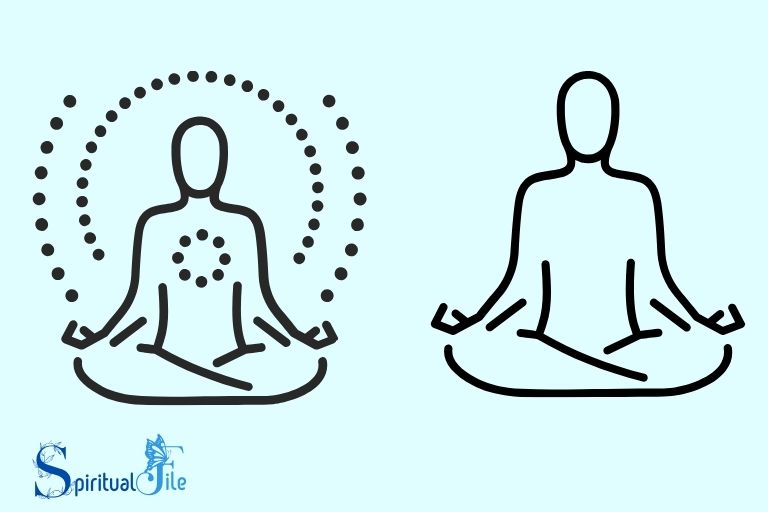Example of Spiritual Person: Explain!
A spiritual person is someone who seeks purpose and meaning in life. They quest to understand the universe and their place within it, guided by a set of transcendent values that shape their attitudes and actions.
Spiritual people aim to live a life that is in alignment with their personal belief systems and values, rather than pursuing materialistic or superficial goals.
They seek to foster a deep connection with themselves and others, and often feel connected to nature and the universe as a whole.
Spirituality can be personal or part of a community, and can include a belief in a higher power or deity, but this is not a requirement.
In essence, a spiritual person is someone who prioritizes personal growth, self-awareness, and a sense of peace.
They often engage in practices like meditation, yoga, or prayer to develop their spirituality. For them, spirituality is a journey to find their true selves and understand their place in the universe.
7 Spiritual Persons of Characteristics
| Spiritual Person | Primary Belief | Spiritual Practices | Notable Achievements |
|---|---|---|---|
| Dalai Lama | Buddhism | Meditation, instructions for life | Nobel Peace Prize (1989) |
| Mother Teresa | Catholicism | Works of Mercy | Nobel Peace Prize (1979) |
| Thich Nhat Hanh | Zen Buddhism | Mindfulness meditation | Founded Plum Village Tradition |
| Eckhart Tolle | Spirituality | Meditation, writings on presence | Bestselling author “The Power of Now” |
| Deepak Chopra | New Age spirituality | Meditation, yoga, Ayurveda | Pioneer in field of alternative medicine |
| Rumi | Sufism | Poetry, teachings on love and divinity | Renowned poet and mystic |
| Thomas Merton | Trappist | Contemplation, writings on spirituality | Prolific spiritual writer |
Key Takeaway

Five Facts About: Characteristics of a Spiritual Person
Understanding The Essence Of A Spiritual Person
A spiritual person exemplifies qualities like empathy, compassion, and selflessness in their actions and interactions.
Their heightened awareness and connection to something greater guides them in finding meaning and purpose in life.
What Makes A Person Spiritual?
- Spirituality refers to the pursuit of connection with something greater than oneself, often resulting in inner peace, self-awareness, and a sense of purpose.
- A spiritual person recognizes the interconnectedness of all beings and seeks to live a life aligned with higher values and principles.
- Spirituality is not limited to a specific religion or belief system; it can be experienced in various ways depending on individual perspectives and personal growth.
- Spirituality involves the exploration of deeper questions about existence, meaning, and the nature of reality.
- A spiritual person strives for personal growth, self-discovery, and the development of compassion and empathy towards oneself and others.
Exploring Different Definitions Of Spirituality:
- Spirituality can be seen as a journey, a continuous process of self-discovery and introspection.
- It involves seeking a greater understanding of oneself, the world, and the mysteries of life.
- Spirituality can encompass religious practices, but it goes beyond traditional religious frameworks to embrace a more personal and individual experience.
- Some see spirituality as a connection with nature and the universe, finding solace and peace in the beauty and vastness of the world around them.
- Others view spirituality as a way to cultivate mindfulness and be fully present in the present moment.
Understanding the essence of a spiritual person goes beyond religious affiliations or practices. It involves seeking a deeper connection with oneself, others, and the world.
A spiritual person embraces personal growth and lives a life aligned with higher values and principles.
Exploring different definitions of spirituality allows for a more inclusive and diverse understanding of this multifaceted concept.
Key Characteristics Of A Spiritual Person
A spiritual person exemplifies key characteristics such as humility, compassion, and mindfulness, seeking a deeper connection with the divine.
Their actions reflect a genuine desire to cultivate inner peace and harmony for themselves and others. They approach life with gratitude, openness, and a strong moral compass, inspiring those around them.
Developing Self-Awareness And Mindfulness
- Self-awareness is a key characteristic of a spiritual person, enabling them to understand their thoughts, emotions, and behaviors.
- Mindfulness, on the other hand, involves being fully present in the moment and observing one’s thoughts and sensations without judgment.
Key Characteristics Of A Spiritual Person:
Developing self-awareness and mindfulness:
- Through self-reflection and observation, spiritual individuals gain a deep understanding of themselves, their strengths, weaknesses, and motivations.
- By practicing mindfulness, they cultivate awareness of their thoughts, emotions, and physical sensations, leading to greater clarity and focus in their lives.
Cultivating Compassion And Empathy
- Compassion and empathy are vital qualities that spiritual individuals possess, enabling them to connect with others on a profound level.
- These characteristics go beyond mere sympathy or understanding, as they involve genuinely feeling and sharing the emotions of others.
Key Characteristics Of A Spiritual Person:
Cultivating compassion and empathy:
- Spiritual individuals develop a genuine concern for the well-being of others, showing kindness, understanding, and support.
- By placing themselves in the shoes of others, they not only empathize but also take action to alleviate suffering and promote positive change.
Nurturing A Sense Of Purpose And Meaning
- Spiritual people often find meaning and purpose in their lives, transcending mere materialistic pursuits.
- They seek to align their actions with a greater purpose, whether it be spiritual growth, contributing to society, or making a difference in the lives of others.
Key Characteristics Of A Spiritual Person:
Nurturing a sense of purpose and meaning:
- Spiritual individuals strive to lead meaningful lives, guided by principles that align with their values and beliefs.
- They seek a sense of purpose beyond personal gratification, dedicating themselves to causes or paths that bring fulfillment and contribute to the greater good.
A spiritual person embodies key characteristics such as developing self-awareness and mindfulness, cultivating compassion and empathy, and nurturing a sense of purpose and meaning.
These qualities enable them to navigate life with greater clarity, empathy, and a deep sense of purpose, fostering personal growth and positively impacting those around them.
Exploring Practices Of A Spiritual Person
Explore the practices of a spiritual person and gain insight into the example of a truly spiritual individual.
Discover their unique approach to spirituality and the transformative effects it has on their life. Immerse yourself in their journey and learn from their wisdom and experiences.
In the journey of spirituality, individuals embrace various practices that help them connect with their inner selves and the divine.
These practices are diverse and cater to different aspects of the mind, body, and soul. Let’s delve into some common practices that spiritual individuals explore:
Meditation And Contemplation:
- Meditation is the cornerstone of a spiritual person’s routine, providing them with a sense of calm and clarity.
- By focusing on their breath or a specific point of concentration, individuals can quiet the mind, reduce stress, and attain a state of inner peace.
- Contemplation, on the other hand, involves reflecting on deep philosophical or spiritual questions. This process encourages self-discovery and a deeper understanding of life’s mysteries.
Mindful Movement And Yoga:
- Mindful movement practices, such as tai chi or qigong, help spiritual individuals cultivate awareness and presence in their physical bodies.
- Yoga, an ancient practice originating from the east, combines physical postures (asanas) with breath control and meditation. It facilitates both physical and mental well-being, promoting balance and harmony.
Journaling And Self-Reflection:
- Journaling serves as a powerful tool for spiritual growth and self-reflection. It allows individuals to record their thoughts, emotions, and observations, providing a space for self-expression and introspection.
- Engaging in self-reflection enables spiritual individuals to gain insights into their thoughts, behaviors, and patterns. It fosters personal growth, self-awareness, and a deeper connection with one’s spiritual journey.
As spiritual seekers, incorporating these practices into their daily lives can profoundly impact their well-being and foster a greater connection with their spirituality.
Whether through meditation, mindful movement, or journaling, these practices offer valuable tools for exploring the depths of one’s spirit.
Spiritual Person Vs. Religious Person: Unraveling The Differences
A spiritual person embraces a sense of connection to a higher power or divine energy, seeking meaning and purpose beyond religious structures.
With an emphasis on personal beliefs, spiritual individuals direct their focus inward to cultivate self-awareness, mindfulness, and a sense of inner peace.
Distinguishing Between Spirituality And Religion
When exploring the realm of spirituality, it’s important to understand the distinction between being spiritual and being religious. While these terms are often used interchangeably, they signify different aspects of personal belief and practice.
Here’s a breakdown of how spirituality and religion differ:
Spirituality is an inward journey:
- It focuses on developing a personal connection with the divine or higher power.
- It involves exploring one’s own beliefs and understanding of the universe and existence.
- Spirituality often emphasizes the individual experience and the search for meaning and purpose in life.
Religion involves organized belief systems:
- It typically follows a specific set of doctrines, rituals, and practices.
- Religion often revolves around a community of believers who share similar beliefs and values.
- It offers a framework for moral guidelines and provides a sense of belonging to a larger group.
Similarities And Overlaps Between Spirituality And Religion
While spirituality and religion differ in some ways, there are also areas where they intertwine and overlap.
Let’s delve into the similarities between these two dimensions:
Shared quest for transcendence:
- Both spirituality and religion seek to explore the depths of human existence.
- They share a common goal of connecting with something greater than ourselves, whether it’s the divine, the universe, or a higher power.
Moral and ethical guidance:
- Both spirituality and religion provide a moral compass to guide individuals in their daily lives.
- They aim to shape behavior and promote virtues such as compassion, kindness, and integrity.
Rituals and practices:
- Both spirituality and religion incorporate rituals and practices as vehicles for expression and devotion.
- These can include prayer, meditation, chanting, or engaging in specific ceremonies or sacraments.
Community and support:
- Both spirituality and religion offer the opportunity to connect with like-minded individuals and find solace in a shared belief system.
- They provide a sense of community, support, and the possibility of engaging in collective worship or spiritual gatherings.
Through understanding the differences and recognizing the overlapping aspects of spirituality and religion, we can embrace the diversity of human beliefs and experiences.
Whether one chooses a spiritual path or follows a specific religious tradition, both avenues offer opportunities for personal growth, introspection, and connection to something greater than ourselves.
Examples Of Spiritual Figures In History
Throughout history, numerous individuals have embodied spirituality, serving as guiding lights for others.
From buddha’s enlightenment to mother teresa’s selfless service, these examples remind us of the power of faith and compassion. Their teachings and actions continue to inspire and resonate with people around the world.
Spirituality is a deep-rooted aspect of the human experience, encompassing beliefs, values, and a connection to something greater than ourselves.
Throughout history, there have been notable figures who have exemplified the essence of spirituality through their actions, teachings, and profound impact on others.
In this section, we will explore three influential spiritual figures who have left an indelible mark on the world: mahatma gandhi, mother teresa, and rumi.
Mahatma Gandhi: Embracing Non-Violence And Peaceful Resistance
- A pioneer of nonviolent civil disobedience, mahatma gandhi stood as a beacon of hope and inspiration during india’s struggle for independence from british rule.
- Gandhi’s unwavering commitment to nonviolence showcased his embodiment of spiritual principles as a means to effect change. He believed in the power of love and compassion, emphasizing that violence could never be a solution.
- Through practices like fasting, meditation, and self-discipline, gandhi harnessed his spiritual beliefs to guide his actions, encouraging others to follow suit.
- By advocating for satyagraha, a philosophy of truth and nonviolence, gandhi challenged the status quo and urged others to confront oppression peacefully.
- His fight for social justice not only inspired his countrymen but also transcended borders, influencing civil rights movements around the world.
Mother Teresa: Dedication To Serving The Less Fortunate
- Mother teresa, known as the “saint of the gutters,” dedicated her life to helping the most vulnerable members of society.
- Guided by her unwavering faith and spiritual convictions, she founded the missionaries of charity, an organization that provided care and support to the destitute and terminally ill.
- Mother teresa’s compassion, empathy, and selflessness were the embodiment of her spiritual devotion. She believed in the inherent worth of every human being, regardless of their circumstances.
- Through her tireless efforts, she brought attention to the plight of the poor and marginalized, becoming an inspiration for countless individuals seeking to make a difference.
- Mother teresa’s legacy is a testament to the transformational power of spirituality, as she showed that serving others with love and kindness can truly change lives.
Rumi: Enlightenment Through Poetry And Ecstasy
- Rumi, the 13th-century persian poet, mystic, and philosopher, is celebrated for his profound spiritual teachings that continue to resonate with people today.
- At the core of rumi’s philosophy was the belief in the power of love as a transformative force. Through his poetry, he expressed the longing for union with the divine and explored the depths of human emotions.
- Rumi’s ecstatic poems, filled with metaphors and symbolism, aimed to awaken the reader’s spiritual essence and transcend the limitations of the material world.
- His teachings emphasized the importance of self-discovery, inner transformation, and the removal of ego to connect with the divine. Rumi’s work has inspired countless seekers on the path to spiritual enlightenment.
- Through his evocative poetry, rumi invites us to delve into the mysteries of existence and embrace the spiritual journey with open hearts and minds.
These spiritual figures serve as guiding lights, reminding us of the profound impact that spirituality can have on individuals, societies, and the world as a whole.
Their stories, teachings, and actions inspire us to seek higher truths, cultivate compassion, and embrace a deeper connection with ourselves and those around us.
Scientific Perspective On Spirituality
A scientific perspective on spirituality explores the example of a spiritual person, delving into the intersection of science and spiritual practices.
The focus is on understanding the connection between spirituality and the human experience through scientific methods and research.
Spirituality has long been associated with various religious and philosophical beliefs. However, from a scientific standpoint, spirituality can be seen as a deeply personal and subjective experience that can have profound effects on mental well-being and physical health.
Researchers have delved into understanding the benefits of spirituality and have made intriguing connections with mental and physical well-being.
Let’s explore some of these scientific findings:
Research On The Benefits Of Spirituality On Mental Well-Being
- Practicing spirituality has been found to have a positive impact on mental health, promoting overall well-being and enhancing one’s ability to cope with stress and adversity.
- Regular spiritual practices, such as meditation or prayer, have been linked to mitigation of anxiety, depression, and other psychological disorders.
- Studies indicate that individuals with a strong spiritual belief system tend to have a more optimistic outlook on life and experience higher levels of happiness and life satisfaction.
- Engaging in spiritual practices fosters a sense of purpose and meaning, which can greatly contribute to a person’s mental resilience and ability to bounce back from difficult situations.
Exploring The Connections Between Spirituality And Physical Health
- Research suggests that spiritual well-being is associated with better physical health outcomes. People who actively practice spirituality tend to have lower blood pressure, reduced risk of heart disease, and strengthened immune systems.
- Studies have linked regular spiritual practice with improved pain management and quicker recovery from illness or surgery.
- Spirituality has been found to have a positive effect on chronic conditions such as cancer, diabetes, and autoimmune diseases. It promotes a sense of hope, increases the ability to cope with symptoms and treatments, and enhances overall quality of life.
- Engaging in spiritual activities that promote mindfulness and self-care, such as yoga or tai chi, can improve physical balance, flexibility, and overall fitness.
Understanding spirituality from a scientific perspective allows us to appreciate the profound impact it can have on our mental and physical well-being.
Incorporating spiritual practices into our lives may provide us with the tools to navigate life’s challenges and enhance our overall health and happiness. So why not take a moment to explore and connect with the spiritual aspects of our being?
Embracing Spirituality In Daily Life
Embracing spirituality in daily life can be seen in the example of a person who radiates inner peace, practices mindfulness, and seeks a deeper connection with the universe.
This individual embraces spiritual practices such as meditation, gratitude, and self-reflection, allowing them to lead a more meaningful and fulfilling life.
Living a spiritual life doesn’t mean you have to retreat to a monastery or spend hours meditating in solitude. Embracing spirituality is about integrating spiritual practices into your daily routines and finding connection with the world around you.
Whether you’re walking in nature, practicing mindfulness, or engaging in acts of kindness, there are numerous ways to infuse spirituality into every aspect of your life.
Integrating Spiritual Practices Into Daily Routines
- Morning rituals: Begin your day with a few moments of stillness and reflection. Practice deep breathing exercises, express gratitude, or set positive intentions for the day ahead.
- Mindful eating: Engage in mindful eating by savoring each bite and expressing gratitude for the nourishment it provides. Pay attention to the flavors, textures, and aromas of your food.
- Prayer or meditation: Set aside time each day for prayer or meditation. Find a quiet space where you can focus on connecting with your inner self or a higher power.
- Journaling: Keep a journal to capture your thoughts, emotions, and experiences. Reflecting on your day can enhance self-awareness and provide insight into your spiritual journey.
- Acts of kindness: Look for opportunities to express kindness and compassion towards others. Simple acts like volunteering, helping a neighbor, or offering a kind word can uplift your spirits and deepen your connection with humanity.
Finding Spirituality In Nature And The Outdoors
Nature walks: Take regular walks in nature to rejuvenate your mind, body, and spirit. Pay attention to the sights, sounds, and sensations around you. Let nature’s beauty and serenity inspire and calm you.
Outdoor meditation: Find a serene spot outside and engage in meditation. Allow the sounds of nature to guide your practice, whether it’s the rustling of leaves, the chirping of birds, or the gentle flow of a nearby stream.
Communing with animals: Spend time with animals, whether you have pets or visit a local sanctuary. Observe their simplicity, innocence, and unconditional love. These interactions can help you cultivate a deeper appreciation for life and its interconnectedness.
Sacred spaces in nature: Discover and visit natural areas that hold spiritual significance for you. It could be a serene waterfall, a majestic mountain peak, or a tranquil beach. These sacred spaces can provide moments of awe and inspiration, nurturing your spiritual connection.
By integrating spiritual practices into your daily routines and immersing yourself in the beauty of nature, you can find comfort, peace, and a deeper connection with the world around you.
Embracing spirituality is a personal journey that can enrich your life and bring a sense of meaning and purpose to your daily existence.
FAQ About Example Of Spiritual Person
What Is An Example Of Being Spiritual?
Being spiritual can vary from person to person, but one example is practicing mindfulness and meditation.
What Is A Spiritual Person?
A spiritual person is someone who seeks a deeper meaning or connection beyond the physical world. They focus on growing their inner self, exploring their beliefs, and finding purpose and peace in life.
Spiritual individuals may engage in various practices like meditation, prayer, or contemplation to nurture their spiritual well-being.
They may also align their actions with ethical values, promote compassion, and strive for personal growth and enlightenment.
Spirituality is a personal journey that differs for each individual, and it can be practiced within or outside the framework of a religious tradition.
Being spiritual does not necessarily mean being religious; it can be a way to explore one’s own existence and develop a meaningful connection to oneself, others, and the universe.
What Are The Characteristics Of A Spiritual Person?
A spiritual person is characterized by their connection to the divine, inner peace, and a sense of purpose. They often exhibit qualities such as compassion, gratitude, and mindfulness.
Spiritual individuals prioritize personal growth and self-reflection, seeking to understand their place in the universe.
They are open-minded and tolerant, seeking unity and harmony with others and the world around them.
A spiritual person may engage in practices such as meditation, prayer, or yoga to deepen their spiritual connection. They strive to live a life aligned with their values and beliefs, emphasizing love, kindness, and forgiveness.
Overall, a spiritual person seeks to cultivate a deeper understanding of themselves and their purpose, fostering a sense of meaning and fulfillment in their lives.
How Do You Describe Yourself As A Spiritual Person?
I am a spiritual person who seeks inner peace and connection to a higher power. I believe in the power of meditation and mindfulness to cultivate a calm mind and a loving heart.
Through spiritual practices, i strive to align my thoughts, words, and actions with spiritual values such as compassion, gratitude, and forgiveness.
I find inspiration in nature and appreciate the beauty and interconnectedness of all living beings.
Being spiritual helps me navigate life’s challenges with resilience and grace. It is a continuous journey of self-discovery and growth, where i strive to live authentically and make a positive impact in the world.
Spirituality brings meaning and purpose to my life, filling it with joy, love, and harmony.
What Does It Mean To Be A Spiritual Person?
Being a spiritual person means having a deep connection with oneself and the universe, seeking a higher purpose in life.
Conclusion
The example of a spiritual person we have explored in this blog post demonstrates the power of faith, mindfulness, and self-reflection in one’s spiritual journey.
By practicing gratitude, seeking inner peace, and embracing empathy and compassion, this individual showcases the transformative effects of spirituality on their life.
Their commitment to personal growth and their nurturing of a deep connection with the divine not only benefits their own well-being but also influences those around them positively.
As we have witnessed, spirituality is not confined to a specific religion or belief system but is a universal concept that transcends boundaries and promotes harmony and unity.
By embodying the qualities of a spiritual individual, we can foster a greater sense of purpose, find solace in challenging times, and foster a more compassionate and caring society.
Let us strive to embrace these virtues as we embark on our own spiritual journey, seeking fulfillment and enlightenment in our lives.






